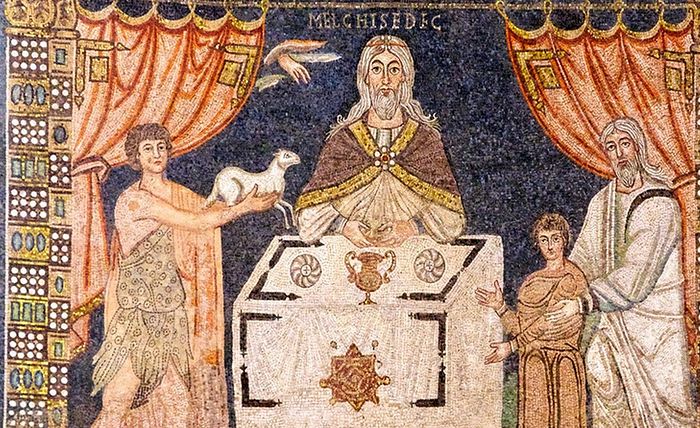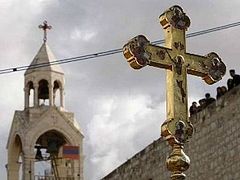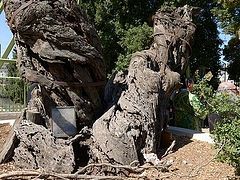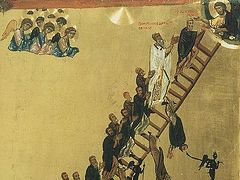Source: A Lamp for Today
April 8, 2016
Readings: Hebrews 6:13-20; Mark 9:17-31
Genesis 14:14-20; Genesis 22:16-18; Isaiah 52: 13-53:6
Usually, when we hear the word “forerunner,” we think of John the Baptizer, who prepared for the coming of the Lord. But our epistle reading for this fourth Sunday of Lent tells us that we have an even greater Forerunner—Jesus himself, the one who has run the perfect race, entered into Hades, vanquished death, assumed the resurrection life, and gone into the Heavenly Temple before us, even to the Holiest Place. In him we see both perfect man, and perfect God: so he has completely been where we are (and retains this human identity), and is wholly and properly in the heavenly place, as God the Son. As John saw in his vision, he is both “in the midst of the throne and in the midst of the elders” (Rev. 5:6). Jesus’ dual identity is an astonishing truth which took even God’s people by surprise, but we find hints of it in the very beginning of the Bible. As our epistle reading, Hebrews 6:13-20, tells us, in Genesis 22:16-18, God speaks to Abraham, and CONFIRMS what he says “by an oath,” giving the Old Testament saint an anticipation of the great things that were to come. Though Abraham could not see it all, he was given, by God’s word, hope—the Hope that the apostles saw with their own eyes, and the Hope Whom we meet every time we receive the Holy Mysteries.
Here is the reading from the epistle:
For when God made a promise to Abraham, because He could swear by no one greater, He swore by Himself, saying, “Surely blessing I will bless you, and multiplying I will multiply you.” And so, after he had patiently endured, he obtained the promise. For men indeed swear by the greater, and an oath for confirmation is for them an end of all dispute. Thus God, determining to show more abundantly to the heirs of promise the immutability of His counsel, confirmed it by an oath, that by two immutable things, in which it is impossible for God to lie, we might have strong consolation, who have fled for refuge to lay hold of the hope set before us.
This hope we have as an anchor of the soul, both sure and steadfast, and which enters the Presence behind the veil, where the forerunner has entered for us, even Jesus, having become High Priest forever according to the order of Melchizedek. (Hebrews 6:13-20)
God’s promise to Abraham, that by his seed—by his descendent, the Lord Jesus—all the nations would be blessed, is for us “strong consolation.” It is to HIM that we have fled for refuge, and by him that we lay hold of a solid hope. Our hope, like Jesus –the crucified, risen and ascended one— is lively. Because of him, and because he has made us God’s children, we can enter into the heavenly Presence, saying to the mysterious God, “Abba! Father!” In hope we can do this because Jesus, our brother, has gone there ahead of us, a High priest forever.
Who is this priest, Melchizedek, whom the apostle mentions? We hear about Melchizedek in Genesis 14:14-20, which concerns the rescue of Lot and his family by his uncle the patriarch Abraham, when he had been kidnapped by the enemy of the Sodomites among whom Lot had been living. Abraham, on vanquishing this enemy, and rescuing his kins-people, is received gladly by the surrounding kings, and blessed by the mysterious Melchizedek , who brings forth bread and wine, and recognizes the true God of heaven. Abram is blessed by the very strange figure, Melchizedek, king of Salam, who “brought forth bread and wine,” saying “Blessed be Abram of the Most High God, Who made heaven and earth, and blessed be the Most High God, Who delivered thine enemies into thy hand.”
There are many odd things in this story: first, is the name. Melchizedek means “My King is righteousness.” How appropriate to see him, then, as a figure of Jesus, the only King of righteousness. Moreover, he is the “king of Salem”-which means Peace. Jesus is, the prophet Isaiah tells us, “the prince of Peace.” Next, Melchizedek appears out of nowhere, without any word regarding his ancestry, just as Jesus has no human father. Moreover, he both blesses and offers bread and wine: Jesus actually shares ‘flesh and blood’ with his siblings (2:14), nourishing us in the Eucharist. He is, the book of Hebrews tells us, the human-divine priest foreshadowed by Melchizedek. Not only here, but throughout Hebrews, the parallel is made. Jesus is the fulfillment of Melchizedek, and ‘offers himself’ once and for all (7:27), giving his own ‘flesh and blood’ (2:14; 10:19-20). When his body is rent and his blood spilled, he prepares a way for us to follow. By his sacrifice, our hearts are sprinkled (10:22) and our own bodies washed with the pure water (of baptism, 10:22). The unique sacrifice and sacramental life of the Son, who shares the Father’s nature AND our nature, and whose blood fulfills all the sacrifices of the OT, makes its mark upon our lives. He is not ashamed to call us brothers and sisters, but indeed tells us, in echo of him, to ‘offer up a sacrifice’ (13:15) and show forth God’s mystery in the world.
When we think about our Lord and sacrifice, it is helpful to remember not only Melchizedek, who offered bread and wine, but also the portrait of the suffering Servant which the prophet Isaiah gave to us. This Servant served with his very life, not simply with the fruits of the earth. Indeed, the Servant Songs are appointed to be read every Sunday of Great Lent, becoming a focus for our meditation upon the One who lived and died for us:
Behold, my servant shall understand, and be exalted, and glorified exceedingly. As many shall be amazed at thee, so shall thy face be without glory from men, and thy glory shall not be honoured by the sons of men. Thus shall many nations wonder at him; and kings shall keep their mouths shut: for they to whom no report was brought concerning him, shall see; and they who have not heard, shall consider.
O Lord, who has believed our report? and to whom has the arm of the Lord been revealed? We brought a report as of a child before him; he is as a root in a thirsty land: he has no form nor comeliness; and we saw him, but he had no form nor beauty. But his form was ignoble, and inferior to that of the children of men; he was a man in suffering, and acquainted with the bearing of sickness, for his face is turned from us: he was dishonoured, and not esteemed. He bears our sins, and is pained for us: yet we accounted him to be in trouble, and in suffering, and in affliction. But he was wounded on account of our sins, and was bruised because of our iniquities: the chastisement of our peace was upon him; and by his stripes we were healed. All we as sheep have gone astray; every one has gone astray in his way; and the Lord has laid on him the iniquity of us all. (Isaiah 52:13-53:6)
This very one whom so many ignored, and whom the world crucified, is the one who is now exalted, at whom all the nations shall wonder. Outwardly, he was unassuming, and became a man acquainted with grief—but his sorrow was in fact OURS, for he took upon himself all that it is to be human, including our sin and death. And we know the triumph: he trampled down death by that death. As the author to the Hebrews puts it, he entered behind the veil into the holy place, preparing the way for us!
St. John Chrysostom, in his sermon on this passage of Hebrews, speaks of Jesus opening the way, of his sacrifice, and of the sacrifice to which we are called:
Jesus shows that while we are still in the world, and not yet departed from [this] life, we are already among the promises. For through hope we are already in heaven….For see, we have our victim on high, our priest on high, our sacrifice on high: let us bring such sacrifices as can be offered on that altar… reasonable service (Romans 12:1) moderation, temperance, mercifulness, enduring ill-treatment, long-suffering, humbleness of mind….These sacrifices one may see in the Old [Testament] also, shadowed out beforehand. Offer to God, it is said, a sacrifice of righteousness (Psalm 4:5); Offer a sacrifice of praise (Psalm 49:14); and, a sacrifice of praise shall glorify Me (Psalm 49:23), and, the sacrifice of God is a broken spirit (Psalm 50:17); and what does the Lord require of you but to hearken to Him?(Micah 6:8) Burnt-offerings and sacrifices for sin You have had no pleasure in: then I said, Lo I come to do Your will, O God! (Psalm 39:6-7)…, and again, To what purpose do ye bring the incense from Sheba? (Jeremiah 6:20) Take away from Me the noise of your songs, for I will not hear the melody of your viols. (Amos 5:23) But instead of these I will have mercy and not sacrifice. (Hosea 6:6) You see with what kind of sacrifices God is well pleased (Hebrews 13:16). You see also that already the first type of sacrifice has given way to those that have come in their place….Mortify your body, and crucify it, and you shall yourself also receive the crown of this martyrdom.
How wonderful! Because the Lord has already gone behind the veil, we have a living hope, not just wishful thinking. Because Jesus has stayed the course—dying, rising, and ascending—we have received the Holy Spirit, and are encouraged to sacrifice our own lives, following our Lord. And, by Jesus, through the words of the prophets, we come to understand that this sacrifice God looks for is a sacrifice of the heart, not simply outer and religious-looking actions. This is something strong for us to take hold of during Great Lent. It is mercy, it is praise to God, it is to do his will. These are the sacrifices that Jesus made, as he offered his entire self; this is the cross that we are told to take up.
This call to a sacrifice of our whole self was exemplified remarkably by St. John Climacus, that great ascetic whom we remember this Sunday. He, too, followed the Greatest Forerunner! In his book, on the Ladder of Ascent, he exhorts us: “Follow Christ without anxiety or hesitation, always looking heavenward and expecting help from there, according to the word of the holy man: My soul sticks close behind Thee.” Now, the way of carrying the cross, of climbing the ladder may seem arduous, and sometimes impossible. When we falter, we may be tempted to give up. But St. John Climacus reminds us of the hope that should be ours because of what God has done for us:
Repentance is the daughter of hope and the renunciation of despair.
Contrition is the result of a fall. He who falls is crushed and stands in prayer without boldness but with praiseworthy persistence, as one who is shattered, steadying himself with the staff of hope and using it to drive off the dog of despair.
Blessed is he who hopes; thrice-blessed is he who has the promise; but he who has the reality is an angel…. The power of love is in hope, because by it we await the reward of love. Hope is a wealth of hidden riches. Hope is a treasure of assurance of the treasure in store for us.
Why is it that we can have such a bold hope? Because we have the promise—Remember, God said it, and confirmed it with an oath, to Abraham. Indeed, we have more than a spoken word in a vision and a divine oath: we have the Lord Jesus himself, who came among us, and who has left us, in his family, the Holy Spirit. God himself is truth, and has walked among us in full humanity! He is who he says he is: with God, what we see in Jesus is what we get! IN Jesus all the nations of the earth are blessed: and that includes us, today, in the twenty-first century.
It is this hope that follows Jesus beyond the curtain, knowing that he has gone before us. Because of this hope, our lives are to be a long period of discipleship—as one writer has put it “a long obedience in the same direction.” One episode in the disciples’ apprenticeship shows us why periods like Lent are so very important. The disciples Peter James and John have just been with Jesus on the mount of Transfiguration. They have heard Jesus talking with Elijah and Moses about his coming ordeal, the glory of the cross. When they reach the bottom of the mountain, the knitty-gritty of reality sets in. The other disciples have been trying to do Jesus’ godly work of exorcism, but to no avail:
Then one of the crowd answered and said, “Teacher, I brought You my son, who has a mute spirit. And wherever it seizes him, it throws him down; he foams at the mouth, gnashes his teeth, and becomes rigid. So I spoke to Your disciples, that they should cast it out, but they could not.” He answered him and said, “O faithless generation, how long shall I be with you? How long shall I bear with you? Bring him to Me.” Then they brought him to Him. And when he saw Him, immediately the spirit convulsed him, and he fell on the ground and wallowed, foaming at the mouth. So He asked his father, “How long has this been happening to him?”
And he said, “From childhood. And often he has thrown him both into the fire and into the water to destroy him. But if You can do anything, have compassion on us and help us.” Jesus said to him, “If you can believe, all things are possible to him who believes.” Immediately the father of the child cried out and said with tears, “Lord, I believe; help my unbelief!”
When Jesus saw that the people came running together, He rebuked the unclean spirit, saying to it: “Deaf and dumb spirit, I command you, come out of him and enter him no more!” Then the spirit cried out, convulsed him greatly, and came out of him. And he became as one dead, so that many said, “He is dead.” But Jesus took him by the hand and lifted him up, and he arose.
And when He had come into the house, His disciples asked Him privately, “Why could we not cast it out?” So He said to them, “This kind can come out by nothing but prayer and fasting.” (Mark 9:17-29).
It took the presence of Jesus with them and the feeble faith of the child’s father, which Jesus kindled. It took prayer and fasting. And that is the path to which we are called in this great Lent. Just after this episode in which Jesus casts out the demon, and teaches the disciples about faith, prayer and fasting, he redirects their eyes to the greatest challenge that they will have to face:
Then they departed from there and passed through Galilee, and He did not want anyone to know it. For He taught His disciples and said to them, “The Son of Man is being betrayed into the hands of men, and they will kill Him. And after He is killed, He will rise the third day.” (Mark 9:30-31)
He told them ahead about his great ordeal, so that they would continue to hope and not to despair when it came upon them in that dark Garden. Because he prepared them, they knew that another Garden awaited them, on the third day, on the resurrection morning. Like the disciples, then, let us heed Jesus’ words about faith, prayer and fasting during this season. Let us also keep in the back of our minds the truthful promises of God, who spoke hope to the patriarch Abraham, confirming it with an oath, and demonstrating it to us in the Incarnation of his Son. And like St. John Climacus, let us keep our eyes on the goal, for the joy that is set before us.




